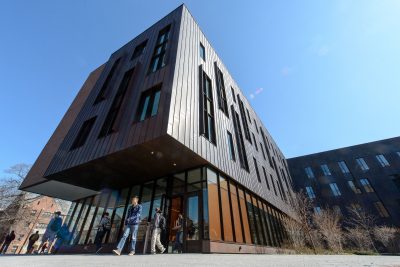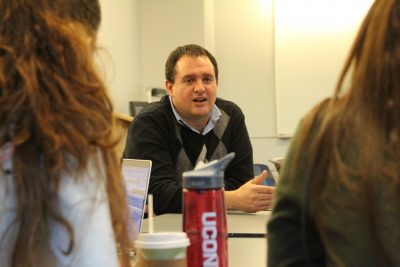
Here is a brief recap of some of the happenings so far this Fall semester
In September, the Medieval Studies section hosted the third iteration of Medieval Live! A Multimedia Middle Ages, organized by Professor Andrea Celli. In addition to performances by students and faculty of texts in original languages of the medieval period, Visiting Scholar Professor Dyan Elliot of Northwestern University delivered a talk titled “The Corrupter of Boys: the Medieval Church and Child Abuse”. In November, Professor Celli – along with the Italian and Medieval Studies sections – hosted “Leaves that scatter through the universe,” a seminar on Dante’s works in context. Presentations by invited speakers included Giovanni Spani of College of the Holy Cross’ piece “Who Were Dante’s Merchants?”; Francesco Marco Aresu of Wesleyan University’s “Dante’s Books: Materiality and Textuality of the Comedy”; and Michael Papio of Umass Amherst’s “Creative Interpretation in Bocaccio’s Commentary on Dante’s Inferno”.
November also saw a visit to campus by Michigan University Professor Bill, who came to speak about his work in the field of language acquisition. VanPatten – who’s extensive résumé currently lists him as Professor of Spanish and Second Language Studies, affiliate faculty member in Cognitive Science, Director of Romance Language Instruction, and co-editor of the international journal Studies in Second Language Acquisition at Cambridge University Press – argues that the traditional rules-based model of language instruction fails to form underlying linguistic representation in the learner’s mind. Linguistic “rules” as we generally understand them, according to VanPatten, exist exclusively on the level of explicit knowledge and are never internalized to generate implicit understanding of linguistic structures. The consequences of this line of thought for language instruction and research in language acquisition, as VanPatten suggests, may prove to be transformative.
The Center for Judaic Studies and Contemporary Jewish Life celebrated its 36th anniversary this November with a panel discussion by Center alumni and long-term contributors and UConn Professors Arnold Dashefsky and Stuart Miller. The event also featured a keynote address by David Ruderman, Professor of Modern Jewish History and Director of the Herbert D. Katz Center Judaic Studies at the University of Pennsylvania, presenting an overview of the evolution Judaic Studies over the past 36 years.
LCL’s Spanish section, in association with the Women’s, Gender, and Sexuality Studies Program, Puerto Rican/Latin American Cultural Center, and LANGSA, sponsored a presentation by Professor Danae Diéguez of the Facultad de Arte de los Medios de Comunicación Audiovisual de la Universidad de las Artes (Cuba). Professor Diéguez, who is a specialist in gender and sexuality as well as Cuban and women’s film, gave a Spanish-language talk titled “Tensiones y (dis)tensiones entre el cine cubano y la institucionalidad. Diálogos posibles” [“Tensiones and (dis)tensions between Cuban Film and Institutionalism. Possible dialogues”] which was interpreted live for the English-speaking audience.
The 2015 Deutsch-Kolloquium (sponsored by LANGSA) is presenting two talks this Fall semester. On November 19th, PhD candidate Silke Gräfnitz will present her piece “Female, foreign, flee(t)ing – Female voices from war and conflict zones”. Then on December 2nd, Professor Katharina von Hammerstein will deliver “Germany’s ‘Other Genocide’: Essential Witnesses to Mass Killings of the Herero in German Southwest Africa, 1904-08”.
On December 3rd, the Medieval Studies Program will host Professor Laura K. Morreale, Associate Director of Medieval Studies at Fordham University, for a presentation titled “Telling the Story of French. After the Linguistic, Spatial, and Digital Turns”. The talk will focus on the emergence and circulation of early French-language texts in the Eastern Mediterranean and elsewhere.
 Last spring, Professor of French, Francophone and Film Studies Eliane DalMolin was approached in Paris by a Professor of Comparative Literature at Fudan University, Shanghai, who was familiar with her work. This professor asked DalMolin to consider a fully funded invitation to Fudan in October 2015 to speak about her past work on Baudelaire and Modernity, Psychoanalysis and Feminist Deconstruction, and her current work on Zoopoetics and Ecolyricism. As Professor DalMolin is keen to point out, “all good stories start in Paris.”
Last spring, Professor of French, Francophone and Film Studies Eliane DalMolin was approached in Paris by a Professor of Comparative Literature at Fudan University, Shanghai, who was familiar with her work. This professor asked DalMolin to consider a fully funded invitation to Fudan in October 2015 to speak about her past work on Baudelaire and Modernity, Psychoanalysis and Feminist Deconstruction, and her current work on Zoopoetics and Ecolyricism. As Professor DalMolin is keen to point out, “all good stories start in Paris.”
